![]()
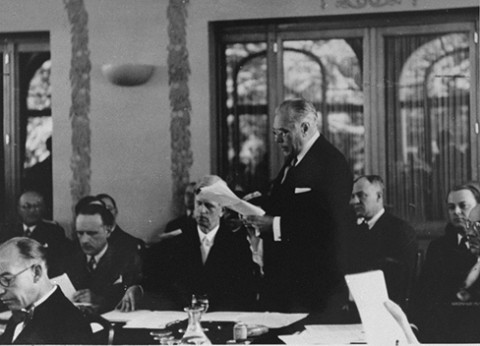
American businessman Myron C. Taylor addresses the International Evian Conference on Jewish Refugees from Nazi Germany. James Grover McDonald is seated next to him. (Evian-les-Bains, France, July 15, 1938 / National Archives)
The Evian Conference, from July 6 to July 15 1938, was convened at the initiative of U.S. President Franklin D. Roosevelt to discuss the issue of increasing numbers of Jewish refugees fleeing Nazi persecution. The Conference at the French resort of Évian-les-Bains was attended by representatives from 32 countries and 39 private organizations. Twenty-four voluntary organizations also attended and around 200 journalists came from all over the world to report about the conference. However, President Roosevelt chose not to send his secretary of state or any other high-level government official to Evian; instead, Myron Charles Taylor, an American industrialist, and James G. McDonald as Taylor’s advisor, represented the U.S. government at the conference. Going into the conference, President Roosevelt gave Taylor the instruction: “All you need to do is get these people together.”
German Jews, already persecuted by Hitler’s Nazi regime since 1933, were made stateless refugees in Nazi Germany by the antisemitic 1935 Nuremberg Laws and were trying to flee from the Nazi persecution. However, many of the German Jews were unable to find countries willing to take them in. Although the 1938 Evian Conference was convened to address the Jewish refugee problem and Conference delegates expressed empathy for Jews under Nazism, the representatives offered only excuses for not letting in more refugees. No country — including the United States, Canada, Australia and Britain (including British controlled Palestine — the 1939 [MacDonald] White Paper severely restricted Jewish immigration to Palestine to please the Arabs) — was willing to accept substantial numbers of Jewish refugees with the exception of the tiny Dominican Republic which offered to accept up to 100,000 Jewish refugees. As a result, the Evian Conference was a failure and left the Jews with no escape from Nazi Germany and Austria (annexed by Hitler in March 1938). The fact that the Evian Conference did not pass a resolution condemning the German treatment of Jews was widely used in Nazi propaganda and further emboldened Hitler in his assault on European Jewry leaving them ultimately subject to Hitler’s “Final Solution to the Jewish Question.”
Present at the Evian Conference was Golda Meir, who became elected Prime Minister of Israel on March 17, 1969, as the [Jewish] observer from Palestine and Chaim Weizmann, who later became Israel’s first elected President on February 1, 1949. Meir described her outrage in her autobiography My Life (1975) that she was “…not even seated with the delegates, although the refugees under discussion were my own people.” She told the press after the conference: “There is only one thing I hope to see before I die and that is that my people should not need expressions of sympathy any more.” After the Evian Conference Weizmann said: “The world seemed to be divided into two parts — those places where the Jews could not live and those where they could not enter.” (quoted in The Manchester Guardian)
The following article about the 1938 Evian Conference was originally published by the Ariel Center for Policy Research (ACPR) in Nativ, a bimonthly journal of “politics and the arts.” It was published in two journals of Nativ — still available in pdf — part one, november 2008 and part two, february 2009. As of 2009, the Ariel Center‘s website appeares to be largely defunct. No journals, white papers or policy papers have been made available online since february 2009. However, older issues in the Nativ archive are still available.
By Ervin Birnbaum
Part One
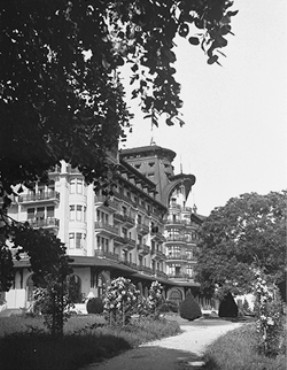
The Hotel Royal, site of the Evian Conference on Jewish refugees from Nazi Germany, 1938. (Evian-les-Bains, France, July 1938 / National Archives)
In its confrontation with Western powers, Iranian tactics of 2008 show a clever replay of Nazi tactics, reminiscent of 1938. Iran has been boycotting, stalling, and side-stepping every Western attempt to halt its nuclear program. So far the United Nations and the Security Council failed to come up with a satisfactory answer to the threat posed by Teheran to the safety of the Western World, and in particular to Israel.
The Six-Nation Meeting in Geneva, Switzerland, on July 19, which for the first time included a high-level US official, Undersecretary of State William Burns, failed to persuade the Islamic Republic to halt its uranium enrichment program. As if it were the five European powers and the USA that are not fulfilling their obligations, the Chief Iranian negotiator, Saeed Jalili, declared at the meeting: “Iran is calling on the Western powers to resume the dialogue”.
The good guy, Iran, is calling on the bad guys, led by the European Union envoy, Javier Solana, to give up on their recalcitrant, childish games of avoiding the real issues, pleading with them “to resume the dialogue”. Hitler reborn. The bad guy is turning to the good guy with the earnest appeal to finally consider becoming good. The Anschluss of Austria in March 1938 was not the invasion of a sovereign state in the heart of Europe. It was the rectification of the evil of Versailles. And so down the lane of history in 1938: The bad guy played the role of the good guy and whatever he did was declared to be yet another saving grace for the world.
The year 1938 — 75 years back — was a chilling year. That year took place the Anschluss of Austria, the Evian Conference, the Munich Agreement, and Krystallnacht.
The Evian Conference was one of the most significant conferences of all times concerning the Jewish people.
The world is doing its best to forget the Evian Conference, 1938. Thus the great Grand Larousse Encyclopedique of France speaks about the beauty of the place (as do other encyclopedias) and mentions solely the Conference of March 1962, which dealt with the signing of a French-Algerian accord. Its most significant conference of all times, that of 1938 is not mentioned.
The Schweitzer Lexicon does indeed mention the Evian Conference, held 6 to 15 of July 1938, “called at F.D.R.’s initiative after Hitler’s march into Austria, to find a suitable solution to the German and Austrian refugee problem”. Note that Jews are not mentioned at all!
The Encyclopedia Brittanica (1982 ed.): “In 1962 a ceasefire agreement between the French Government and the provisional government of Algeria was concluded in Evian.” The 1938 Conference is not mentioned at all by the august encyclopedia.
Obviously, the Evian Conference of 1938, one of the most significant conferences of all times determining the fate of the Jewish People, seems to be swept under the rug by the world, which does its best to forget it.
A Bit of Background to the Evian Conference
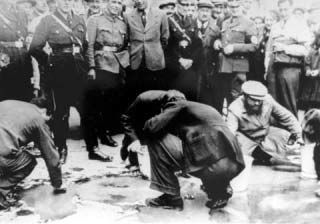
The Jewish Quarter of Leopoldstadt was invaded by triumphant crowds that called families from their houses and forced them to kneel and scrub the pavements… shouting “Perish Jewry”, “Out with the Jews!”
In March 1938, Adolf Hitler staged a sensational march into Austria, with all the clatter and terror, all the pomp and circumstance of which the Nazis became consummate masters. I was as yet a child, growing up in nearby Czechoslovakia, but I remember vividly that watershed event in our lives. It was Friday afternoon. The radio in our home was tuned to Vienna. The news was unambiguous. German troops were marching into Austria. There was a continuous flow of news. As the troops advanced on Vienna, Hitler made his birthplace, Braunau, the first stop and touchingly placed flowers on his mother’s grave.
Late afternoon, Hitler was on his way to the Austrian capital. My father broke away from the radio and ordered us to the Synagogue. For the first time in my recollection he left the radio on for Shabbat in our traditional home. We barely returned from Services, after a hasty Kiddush (blessing over wine) and blessing over the Challah, all attention was focused on the radio again.
About eight o’clock in the evening the Chancellor of Austria, Schuschnigg, gave his final radio address. “Because we did not wish to spill German blood, we have ordered the Austrian army to offer no resistance… I take leave of the Austrian people with a German farewell and the greeting: God protect Austria.” Till midnight we listened to martial music, with occasional excited announcements by the radio reporter about the Fuhrer’s progress.
At midnight excitement reached fever-pitch as Hitler’s motorcade entered the capitol. The bells of the capitol’s revered St. Stephens’ Church were peeling hymns of warm welcome. The delirious crowds cheered, shouted and cried in rapture. The German-speaking Austrians, humiliated by the breakup of their extensive empire at the end of World War I, released their pent-up frustrations in a rapturous welcome to the Fuhrer who dared to say “no” to the Versailles Treaty. Few saw it as a moment of humiliating defeat and the demise of Austria. The masses chose to see it, instead, as the genesis of a new and great German Empire.
By midnight, as the bells of the St. Stephen’s Church in Vienna were triumphantly sounding their hymns, my father quietly remarked: “This is the beginning of the end.”
The Anschluss, as the annexation of Austria by Germany was called, added over 200,000 Jews to Hitler’s Reich, to whom all the Nazi anti-Jewish legislation was promptly applied at an accelerated pace. Adolf Eichmann was placed at the head of the office of Jewish Emigration in Vienna. The complete ruin of Jewish life came a month later when all Jewish holdings and wealth above $2,000 were confiscated by the Nazis. Three quarters of a million Jews now under German rule were reduced to the status of paupers and became fully dependent upon aid from philanthropic agencies abroad. By comparison, other crippling decrees of that year, such as Judaizing one’s name by adding “Israel” or “Sarah”, the loss of tax-exemption by all Jewish charitable and cultural institutions, the transfer of supervision over all religious community organizations to the local Gestapo agents, seemed bland and insignificant.
As the world watched the goings-on, as it received information and pictures of respectable and dignified Jews being driven into the streets of Vienna to wash its pavements and scrub its roads on all fours, it did not utter a sound. There were some formal protests and clicking of the tongue on the part of leading statesmen and diplomats at the League of Nations — nothing more.
We can read of the world being amply informed of what was going on in Austria. On March 16, The New York Times wrote:
This afternoon the Jewish quarter of Leopoldstadt was invaded by triumphant crowds that called families from their houses and forced them to kneel and scrub the pavements…shouting “Perish Jewry”, “Out with the Jews!”
Two days later, The New York Times reported storm troopers “entering Jewish-owned shops and carrying off whatever goods they fancied as well as money, and going into private homes and demanding large sums of money…personal jewelry and other valuables.”
Suicides among Jews of Vienna — in the past negligible in numbers — rose to 200 daily.
These resulted from a sudden total loss of orientation, the Viennese Jews finding no way and nowhere to escape, and the ground opening up under their feet. Simultaneously Italy, Switzerland and Czechoslovakia closed their borders to the Jewish citizens of Austria. All this was reported in the world press.
Part Two
In the wake of the reports regarding the humiliation and sufferings to which Jewry was exposed under the heels of the Nazis, (President) F.D.R. [Roosevelt] called for an international conference with the bold intent of finding a solution for those wretched people. The plan for the conference was announced on March 22, 10 days after the Anschluss.
Hitler’s response to the intended conference was immediate and full of scorn. Addressing himself to the OTHER world as opposed to the Nazi world, he said:
I can only hope and expect that the other world, which has such deep sympathy for these criminals, will at last be generous enough to convert that sympathy into practical aid. We, on our part, are ready to put all these criminals at the disposal of these countries, for all I care, even on luxury ships.
It took a full three and a half months to organize the conference to be held at the French luxury resort, Evian, on Lake Geneva — though the newspapers reported virtually daily shocking episodes of Jewish humiliation (See for example, London Times, June 19, 1938).
No one caught more clearly the impact of the moment than Anne O’Hare McCormick who wrote in The New York Times:
It is heartbreaking to think of the queues of desperate human beings around our consulates in Vienna and other cities waiting in suspense for what happens at Evian… It is not a question of how many unemployed this country can safely add to its own unemployed millions. It is a test of civilization… Can America live with itself if it lets Germany get away with this policy of extermination? (July 4, 1938)
We ought to note: This was not the year 1944, or the year 1942, not even the year 1940. In the beginning of July 1938, The New York Times wrote about the policy of extermination formulated by the Germans against the Jewish People. The tip of the iceberg began showing above the waves; those who were ready to face facts with a grain of realism could tell. The indicators were unmistakable.
On July 6, the Conference opened. Its declared purpose was to seek a solution to the problem of the refugees who wished to leave Germany. Thirty-two nations participated. There was much flamboyant rhetoric. Territories such as Kenya, British Guiana, and Madagascar, whose locations most participating delegates would have difficulties to pinpoint on the map, were generously proposed for refugee settlement — always territories belonging to another party.
Australia, with vast, unpopulated areas, announced: “As we have no real racial problem, we are not desirous of importing one.” [Thomas W. White, Minister for Trade and Customs]
France stressed that it had reached a saturation point.
The Peruvian delegate pointedly remarked that the United States had given his country an example of “caution and wisdom” by its own immigration restrictions.
Central American states issued a joint statement saying that they could accept no “traders and intellectuals”.
Brazil said that every visa application would have to be accompanied by a certificate of Christian Baptism.
Canada was prepared to accept only experienced agricultural workers.
Britain, while prepared to accept Jewish children (some 9,000 eventually arrived), was not willing to accept their parents, because “a sudden rush of Jewish refugees might arouse anti-Semitic feelings”.
The United States would not go beyond its usual annual German immigration quota of 25,957 — although it had allowed only a total of 27,000 German Jews to enter in the six years between Hitler’s rise to power and the Evian Conference. Inexplicably, the US Government demanded of the Jews desiring to migrate to the United States certificates of good conduct from the German police, a cruel and inhuman demand, in the full knowledge that the Germans at the time viewed the Jews worse than vermin.
The Swiss representative, Dr. Heinrich Rothmund, spoke about the threatening refugee inundation of Switzerland. Three or four thousand Jewish refugees had already crossed the frontiers. Rothmund reported. “Switzerland, which has as little use for these Jews as Germany has, will herself take measures to protect Switzerland from being swamped by the Jews”, he declared.
As a result of the Swiss stand, the Conference, whose avowed purpose was to help Jewish refugees, had a disastrous consequence. All German passports of Jews were henceforth stamped by a large red “J”, further curtailing the already limited Jewish freedom to travel.
When Nazi observers at the Conference returned to Berlin they told Hitler: “You can do what you like with the Jews, nobody is interested in them”.
Hitler was triumphant. Didn’t he challenge the democratic world when the Conference was proposed that it be at least generous enough to convert its sympathy into practical aid? Didn’t he make it clear: “We, on our part, are ready to put all these criminals at the disposal of these countries, for all I care, even on luxury ships.”?
The German Danziger Vorposten wrote:
We see that one likes to pity the Jews as long as one can use this pity for a wicked agitation against Germany, but that no State is prepared to fight the cultural disgrace of Central Europe by accepting a few thousand Jews. Thus the Conference serves to justify Germany’s policy against Jewry.
Another newspaper, the Nationalsozialistische Parteikorrespondenz, states that Evian had revealed “the danger which world Jewry constitutes”.
But it wasn’t government policy alone that led to the disastrous Evian stand of the nations. The British Medical Association declared that “no member of the medical profession wishes to see the country inundated by émigrés.”
The Evening Standard put it rather sharply:
It is felt by many people that we hear too much about the trouble of the Jews. They shout too loudly. They make too insistent a demand upon the compassion of the world. Compassion they get — and deserve — but annoyance is apt to accompany it.
Evian was a definite turning point in modern Jewish history. By the time the Conference took place, the Nazis had persecuted the Jews for six years. There were economic boycotts. There were book-burnings. Jews were deprived of their wealth and financial security. They were fired from their jobs. They were declared second-class citizens with dubious protection by law. They were forbidden to sit, shop, and visit in certain places, to employ Christians and associate with them. There were physical harassments and occasional attacks. But there were no mass-deportations and large-scale brutal assaults on a country-wide basis against Jewish residents. These began after Evian.
Evian clearly signaled the world’s indifference to the fate of the Jews. As one newspaper put it, “The Conference serves to justify Germany’s policy against Jewry.” No nation was ready to extend a helping hand to the drowning Jew, when it actually would have been so easy to do so. No country wanted the bother of the Jew. The reasons offered were in some cases no less shattering than the refusal itself. We don’t want a racial problem said one. We don’t need those traders and intellectuals, in other words those parasites, said another. And, verbatim, “we have as little use for them as has Germany,” said a third.
Since it was so unmistakably clear, the Germans caught the signal. The world may, on occasion, issue a formal protest and pay lip service to Christian charity. But underneath the mask of humanitarianism and Christian compassion, the Western world does not want to be troubled by Jewish concerns. Mankind had no interest in the fate of the Jews.
In that sense Evian was a crucial turning point. The Nazis understood that their hands were no more tied by fear of any possible adverse reaction from the civilized world. They caught the consenting nod of the democratic USA, of England, France and Switzerland; altogether 32 countries that met, ostensibly, to help the Jews out of the jaws of the German beast and, instead, threw the Jews to the sharks.
Soon after Evian, deportations began, leading up to the first concerted large-scale brutality known by the name of Krystallnacht, the “Night of the Broken Glass”. Most certainly the Jews would have been better off without Evian. It may have kept the Germans on their toes, never knowing how deeply felt, or how shallow, the humanitarian sentiments of the Western world were. With Evian all confusion and uncertainty evaporated. Nazi Germany was given the green light.
This was the true meaning of Evian. What counts is not what it intended to do, but what it actually did: It utterly betrayed the Jews who placed their trust in civilized humanity.
A brief epilogue need be attached to the gargantuan oversight and callousness of the nations of the world at the splendid lakeside resort of Evian 75 years ago. Not only the encyclopedias (as noted in the beginning of this article), but the present-day political leadership of the nations of the world are doing their best to bury their heads in blissful forgetfulness in the sands of history. There is no other way of explaining the thunderous silence of the United Nations and its many-faceted agencies to the threats of genocide repeatedly uttered by the President of Iran, Ahmedinejad, against Israel, a fellow member State in the United Nations. The Secretary General of the United Nations had recurrent opportunities to indict the Iranian President before the World Court in The Hague. The opportunity is still present and should be exercised without further delay.
It ought to be remembered that barely 13 months after Evian the world was dragged into the abyss of World War II. One-third of world Jewry found itself trapped in the Nazi murder machine. At the time of Evian, all doors were potentially open. A mere consenting nod of participating nations at the fateful Conference could have saved a lion’s share of six million Jews. A year later, all doors of escape were sealed in the face of a desperate people.
However, not only the Jews suffered as a result of the grotesque Evian fiasco. The world was exposed to carnage the like of which it had not experienced since the dawn of human conscience. The philosopher, Santayana observed once wisely: “He who doesn’t learn from history is doomed to repeat it.” Evian should serve as a reminder to the leaders of the world that the time has come to learn from history and not sit on their hands.
Ervin Birnbaum, a leader on the Exodus 1947, was a Professor of Government in New York, Haifa and Moscow Universities and Director of Projects at Ben Gurion’s College of the Negev. Presently Rabbi Emeritus of Beth Israel and Director of “Shearim” (Open Gates) Netanya, he is author of several books and numerous scholarly articles.



 RSS
RSS

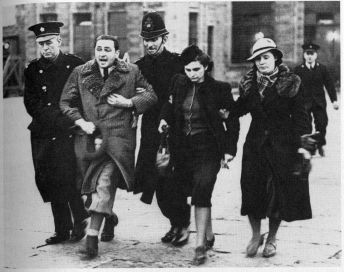
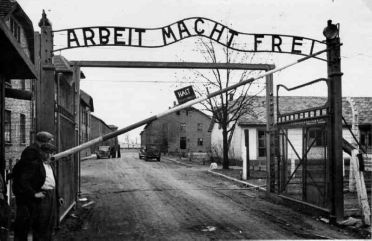
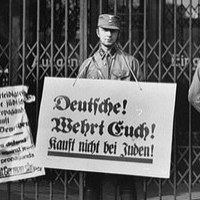

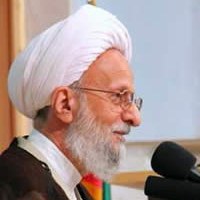

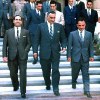




Latest Comments
Hello Mike, Thank you for your positive feedback to the article. I felt there wasn’t too much critical analysis of ...
Thanks for this considered and well constructed article. A follow up article on the manner in which the editorial contro...
THE CLUELESSNESS OF CLAIMING THAT OBAMA'S MIDDLE EAST POLICIES WERE A FAILURE CANNOT BE FURTHER FROM THE TRUTH, WHAT THE...
As long as Obama is the president of the usa do not trust the us government......
Thank you for an good read....